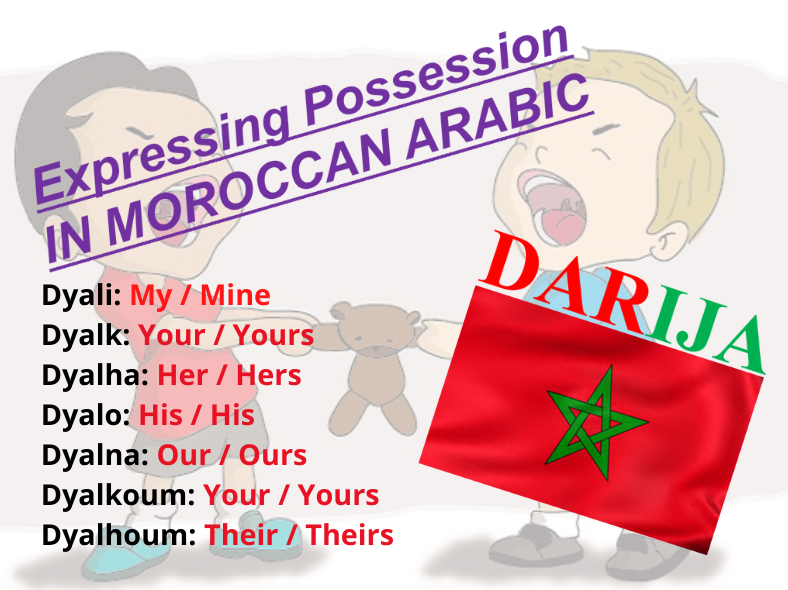While you are in Morocco, Expressing Possession is something important in your daily conversations. This is why we made this lesson to explain it. Then, if you have any questions, feel free to ask in the comment section.
Contents
Expressing Possession With The Word “DYAL”
The word “Dyal” in Darija can be used as the equivalent of the preposition “of ” in English, as a possessive adjective (My, Your,…,Their) or possessive pronouns (Mine, Yours, …, Theirs):
Dyali: My / Mine
Dyalk: Your / Yours
Dyalha: Her / Hers
Dyalo: His / His
Dyalna: Our / Ours
Dyalkoum: Your / Yours
Dyalhoum: Their / Theirs
Lblad Dyali: My country
Lblad Dyalk: Your country (Addressing man or woman)
Lblad Dyalha: Her country
Lblad Dyalo: His country
Lblad Dyalna: Our country
Lblad Dyalkoum: Your country
Lblad Dyalhoum: Their country
NB: The noun used with the word ” Dyal ” is always used in its definite form.
Expressing Possession With Possessive Suffixes
The general Possessive Suffixes are: i, k, ha, o, na, koum, houm.
Example 1: House “Dar “
Dari: My house
Dark: Your house
Darha: Her house
Daro: His house
Darna: Our house
Darkoum: Your house
Darhoum: Their house
Example 2: Brother “Akh”
Some words may have some changes in the suffixes, especially for (my) and (his): ya, k, ha, h, na, koum, houm.
Khouya: My Brother
Khouk: Your Brother
Khouha: Her Brother
Khouh: His Brother
Khouna: Our Brother
Khoukoum: Your Brother
Khouhoum: Their Brother
Example 3: City “Mdina“
For words ending with the letter (a) which are the feminine words, you replace (a) with (t) and apply the same general endings: i, k, ha, o, na, koum, houm.
Mdinti: My City
Mdintk: Your City
Mdintha: Her City
Mdinto: His City
Mdintna: Our City
Mdintkoum: Your City
Mdinthoum: Their City
Finally, Expressing possession with suffixes does not work with all words. For example, we say Jarda dyali (My Garden) and you cant use the suffixes with the word Jarda.
You may be also interested in knowing the Personal Pronouns in Moroccan Arabic.

